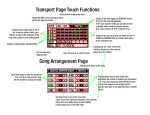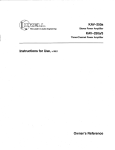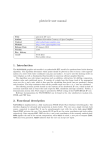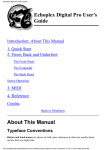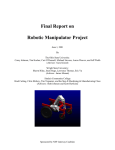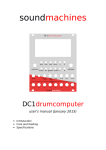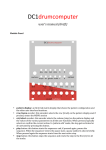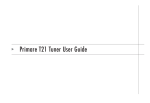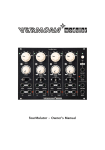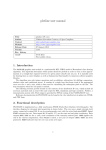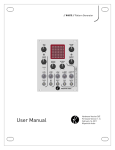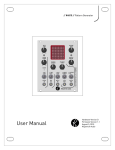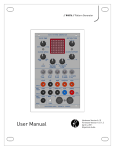Download SEQ-03 Module
Transcript
SEQ-03 Module Operating Manual Table of Contents 1 Introduction.............................................................................3 2 Setup.......................................................................................4 3 General....................................................................................5 4 First start - track types.............................................................6 5 Track Mute..............................................................................9 6 Record Mode.........................................................................10 7 Working with bars.................................................................13 8 Loading and saving sequences..............................................14 Loading Patterns..................................................................14 Saving patterns....................................................................14 9 Shift-functions.......................................................................15 9.1 Shift-functions with options..........................................15 LastStep..........................................................................15 ClkDiv............................................................................15 TrkMode.........................................................................16 Direction.........................................................................16 Quantization...................................................................16 LFO wave.......................................................................17 Sync I/O..........................................................................17 Shuffle............................................................................17 9.2 Shift-functions without options.....................................18 ClrBar.............................................................................18 RemBar...........................................................................18 ClrPatt.............................................................................18 InitPattern.......................................................................18 SeqMode1.......................................................................18 SeqMode2.......................................................................19 StartMode.......................................................................19 SEQ-03 Operating Manual Page 2 1 Introduction MFB's SEQ-03 module is a step-sequencer which is equally suited to trigger drum modules as well as to play and control synthesizers. In addition, each of the 12 available tracks may serve as an AR-envelope or LFO. The SEQ-03 offers three operational modes that cover different applications: 1. Mode 1: This mode allows every track to be used either as CV- or gate-track, AR-envelope or LFO. Sequences can be up to four bars in length with an adjustable number of steps per bar. The speed, i.e. clock division is set globally for all tracks. Shuffle is available but only for use with the internal clock or at external clock with 24ppq resolution. Each track has a dedicated output. 2. Mode 2: The modus equals mode 1 but is fixed to a length of one bar. In exchange, this mode allows for poly-rhythmical patterns. Each track may have an individual number of steps as well as individual clock division. Shuffle is not available in this mode. 3. Mode 3: This mode is dedicated to control synthesizers when wanting to adjust CV values and gate-information per step simultaneously. There are two outputs assigned per track. Track 1 uses jacks CG1 for CV- and CG2 for gate output. Accordingly, this mode offers only six tracks. The track types are fixed in this mode. SEQ-03 Operating Manual Page 3 Note: Switching operational modes forces the currently selected pattern to be initialized, i.e. all programmed step will be lost. 2 Setup MFB's SEQ-03 is fully compatible to Doepfer’s A-100 modular system - in size, bus-power and CV/Gate voltage. Connect the 10-pin MFB-cable to a corresponded 16-pin jack on the mainframe bus. Supply voltage needs to be +/- 12 volts. The wattage is +25/-5mA, the module size is 20HP (half pitches) equivalent to 101,3mm. Attention: Please, check for correct polarity! The colored side of the connector-cable needs to point downwards (-12 V)! SEQ-03 Operating Manual Page 4 3 General We have been trying to develop a complex sequencer in a compact module format that is still easy to use. Hopefully, we have succeeded. However, it is still necessary for you to familiarize yourself with the basic principles of operating the SEQ-03. The SEQ-03 will always be either in Mute Mode, where every track can easily be muted, or in Record Mode. This mode allows programming of the steps. In mute-mode the track-LED will be lit green, in record-mode the Track-LED will be lit red. By pressing Shift the red LEDs will always indicate the sequencer operational mode. Step-LED 14 will additionally indicate the start-mode (see below). By pressing the stepbuttons, you may directly call up the functions ClrBar, RemBar, ClrPatt, Init Patt, SeqMode1, SeqMode2, SeqMode3 and StartMode or a function with additional options to choose from. These so-called shift-functions are LastStep, ClkDiv, TrkMode, Direction, Quantize, LFO Wave and Shuffle. Here, the corresponding Step-LED and Shift-LED will be lit red. By using the step-buttons, the desired option can be selected until Shift is released to leave this menu. SEQ-03 Operating Manual Page 5 4 First start - track types Upon switching on the unit, the SEQ-03 will always enter sequencer mode 1. The track-LED will be lit green and the step-buttons 1-12 can be used to mute the corresponding tracks. The initial sequence has a length of one bar. The BarUpLED will be lit green, indicating that you are located in bar 1. The internal clock is initially selected and the clock- and startjacks serve as outputs (to select an external clock, see clock settings). Press Start to start the sequencer. The SEQ-03 offers four track types. Here is an exemplary introduction... CV-Spur To use track 1 as a CV-track, connect a cable to the CG1 jack output and patch it to the CV-input of another module, e.g. an oscillator. Now, press Start to start the internal clock while adjusting the speed using the tempo control. Setting up and programming a CV-track To set this track up as a CV-track, carry out the following steps: 1. Press and hold the Track button 2. Press Step 1 to select track 1 3. Release both buttons 4. Press a Step button to assign a step - the Step-LED flashes green 5. Para1 adjusts the CV value 6. Para2 adjusts the Portamento value 7. Repeat 4-6 to define further steps SEQ-03 Operating Manual Page 6 Editing multiple steps To edit several steps simultaneously, press and hold Select while pressing the corresponding step-buttons. All steps being selected and flashing can now be edited at the same time. Gate-Track Connect a cable to the second track (CG2) and patch it to the gate-input of an envelope or a comparable module. Setting up and programming a gate-track To set this track up as a gate-track, carry out the following steps: 1. Press and hold the Track button 2. Press Step 2 to select track 2 3. Release both buttons 4. Press and hold Shift 5. Press Step 3 (TrkMode) 6. Release both buttons 7. Press Step 2 8. Press Shift to leave shift-mode 9. Press a Step button to assign a step - the Step-LED flashes green 10. Para1 adjusts the gate intensity 11. Para2 adjusts the gate length 12. Repeat 9-11 to define further steps SEQ-03 Operating Manual Page 7 AR-envelope Connect a cable to the third track (CG3) and patch it to the CVinput of an oscillator or another CV-controllable module. Setting up and programming an AR-envelope track To set this track up as an AR-envelope, carry out the following steps: 1. Press and hold the Track button 2. Press Step 3 3. Release both buttons 4. Press and hold Shift 5. Press Step 3 6. Release both buttons 7. Press Step 3 8. Press Shift 9. Press a Step button to assign a step - the Step-LED flashes green 10. Para1 adjusts the attack time 11. Para2 adjusts the release time 12. Repeat 9-11 to define further steps SEQ-03 Operating Manual Page 8 LFO-Track Connect a cable to the fourth track (CG4) and patch it to another CV-input of a module. Setting up and programming an LFO-track To set this track up as an LFO, carry out the following steps: 1. Press and hold the Track button 2. Press Step 4 3. Release both buttons 4. Press and hold Shift 5. Press Step 3 6. Release both buttons 7. Press Step 4 8. Press Shift 9. Press a Step button to assign a step - the Step-LED flashes green 10. Para1 adjusts the LFO tempo 11. Para2 adjusts the LFO intensity 12. Repeat 9-11 to define further steps 5 Track Mute Press the Track button repeatedly until the track-LED is lit green to enter Mute mode. Now, tracks 1-12 can be muted using the corresponding Step buttons. A muted track is indicated by a red LED for that step. Note: In sequencer operational modes 1 and 2, the 12 tracks can be muted using step-buttons 1-12 with the corresponding step-LEDs being lit red. In operational mode 3 only six tracks are available. Use step-buttons 1-6 to mute these tracks. SEQ-03 Operating Manual Page 9 6 Record Mode Pressing the Track button repeatedly until the track-LED is lit red to enter Record mode. Selecting and programming a track Select a track first by carrying out the following steps: 1. Press and hold Track 2. Select the track by pressing the corresponding Step button 3. Release both buttons The steps are set using the corresponding Step buttons. Press and hold Select to adjust several steps simultaneously. The step-LED of the step set last will flash green. While the step-LED is lit green, two parameters can be adjusted using the potentiometers Para1/Para2. With the parameters being set, select the next step to edit. Alternatively, press Select to avoid displacing the parameters. Track-Parameters The parameters that can be adjusted using Para1 and Para2 depend upon the track-type being selected CV-track Para1: Para2: CV, depending on the quantize-parameter: 3,5,7 octaves in semitones or 0-8 volts with no quantization Portamento SEQ-03 Operating Manual Page 10 Gate-track Para1: Para2: Gate-voltage, adjustable from 6.5 to ca. 9.5 volts, all MFB-drum-modules offer dynamic triggering to control the output volume Gate-length, adjustment range 4-250ms Note: Depending on the tempo, gates may overlap and merge two succeeding gate triggers into one. AR-envelope The envelopes use an exponential type of control. The maximum output is 8 volts. Para1: Para2: Attack-time, Adjustment range: ca. 2.5-700ms Release-time, Adjustment range: ca. 2.5-700ms LFO An individual waveform shape can be selected per LFO, being valid for all steps of a track. However, the amplitude and the tempo can be set per step. A special feature is the non-existing neutral zero-line for the LFO which rather oscillates between zero volts and the defined maximum value (Para2). As with all other track types, parameters 1 and 2 are programmable. In addition, the LFO is reset with each step, making lively "LFO-sequences" possible. Para1: Para2: Tempo: ca. 8s to 10Hz CV, depending on the quantize-parameter: 3, 5 or 7 octaves in semitones or 0-8 volts with no quantization SEQ-03 Operating Manual Page 11 Editing existing steps Each programmed step can be edited at any time. In addition, it is also possible to edit multiple steps at once. This way, new steps as well as existing steps can be edited in one move. 1. Press and hold Select 2. Press all step-buttons for the steps to be edited, existing or new one 3. Release Select 4. Adjust Para1 and/or Para2. All steps will now share the same value. 5. Press Select again to leave edit-mode. All Step-LEDs should now be lit permanently. Note: With CV-tracks, the control voltage may not only be altered by the Para1-control but also using the BarUp and BarDown buttons. This action works relatively to allow transposing a full sequence up or down. SEQ-03 Operating Manual Page 12 7 Working with bars Switching between bars Switch between bars using BarUp- and BarDown. Copying bars Initially, a new pattern has a length of one bar. By pressing BarUp, the contents of the first bar will be duplicated (with bar 2 being selected), allowing to create fast variations. By pressing Shift additionally, just an empty bar will be added. Note: This operation is only possible in operational modes 1 and 3. Individual bars may also be deleted or shifted (see Shiftfunctions). In record-mode, moving LEDs will indicate that the selected bar is currently played. Both LEDs for BarUp- and BarDown display the currently selected track: BarUp green, BarDown off: Bar 1 BarUp red, BarDown off: Bar 2 BarUp off, BarDown green: Bar 3 BarUp off, BarDown red: Bar 4 SEQ-03 Operating Manual Page 13 8 Loading and saving sequences The SEQ-03 allows storing a total of 48 patterns, being organized in three banks of 16 patterns each. To switch between banks carry out the following steps: 1. Press and hold Shift 2. Pressing LoadPatt will advance the bank selection by one. The LED will display the currently selected bank. 3. Release Shift-Taste when the desired bank has been reached LoadPatt-LED Off: Bank 1 Green: Bank 2 Red: Bank 3 Loading Patterns 1. Press and hold LoadPatt - the last selected pattern is indicated by a green step-LED 2. Step buttons 1-16 select the patterns of the current bank 3. Release LoadPatt - the pattern will be switched upon the next bar Saving patterns 1. Press and hold SavePatt - the last selected pattern is indicated by a green step-LED 2. Step buttons 1-16 select the patterns of the current bank 3. Release SavePatt - the pattern is saved and the SavePatt-LED will flash red shortly SEQ-03 Operating Manual Page 14 9 Shift-functions 9.1 Shift-functions with options To adjust these functions carry out the following steps: 1. Press and hold Shift 2. Press the corresponding Step button to select a function 3. Release Shift 4. Shift LED + Step LED will flash red 5. Adjust the option using the Step buttons 6. Confirm by pressing Shift LastStep Use step-button 1-16 to set the number of steps per bar. With the exception of SeqMode2 this setting affects all tracks - no matter if in mute- or record-mode. In SeqMode2 the number of steps can be set per track. Depending whether you are in muteor record-mode, all tracks or just the currently selected track will be adjusted. ClkDiv The step buttons 1-16 are used to set the clock divider: Step 1: 1 = 96th Step 9: 24 = 4th Step 2: 2 = 48th Step 10: 32 ½ triplets Step 3: 3 = 32th Step 11: 48 ½ Step 4: 4 = 16th triplets Step 12: 64 2/3 Step 5: 6 = 16th Step 13: 96 1 Step 6: 8 = 8th triplets Step 14: 128 1 1/3 Step 7: 12 = 8th Step 15: 192 2 Step 8: 16 = 4th triplets Step 16: 288 4 With the exception of SeqMode2 this setting affects all tracks SEQ-03 Operating Manual Page 15 no matter if in mute- or record-mode. In SeqMode2 the number of steps can be set per track. Depending whether you are in mute- or record-mode, all tracks or just the currently selected track will be adjusted. TrkMode This function is only available in operational modes SeqMode1 and SeqMode2. In SeqMode3 all track-types are fixed (see SeqMode3). Depending whether you are in mute- or record-mode, all tracks or just the currently selected track will be adjusted. Step 1: CV-track Step 2: Gate-track Step 3: AR-envelope Step 4: LFO Direction This option sets the order of the sequencer steps being played. Step 1: up Step 2: down Step 3: alternating Step 4: random Depending whether you are in mute- or record-mode, all tracks or just the currently selected track will be adjusted. Quantization This option sets the adjustment range for Para1. Step 1: Step 2: Step 3: Step 4: 3 octaves, quantized in semitones 5 octaves, quantized in semitones 7 octaves, quantized in semitones not quantized, ca. 0-8 volts SEQ-03 Operating Manual Page 16 Depending whether you are in mute- or record-mode, all tracks or just the currently selected track will be adjusted. LFO wave This option sets the waveform shape for a track being used as LFO in record-mode. 1 2 Step 1: saw tooth ascending Step 3: sine Step 2: saw tooth descending Step 4: square Sync I/O This option selects the clock source. Step 1: internal clock, clock out: 16th, tempo control active Step 2: internal clock, clock out: 24ppq Step 2: external clock, 16th Step 3: external clock 24ppq Shuffle This option sets the shuffle intensity by pressing step-buttons 1-16: Step 1: no shuffle Steps 2-16: 15 shuffle-intensity This function is only available in operational modes SeqMode1 and SeqMode3. With the clock source being set to external, Shuffle is only possible with Sync I/O-mode being set to external 24ppq. Note: ClockDiv should be set to 16th! SEQ-03 Operating Manual Page 17 9.2 Shift-functions without options To adjust these functions carry out the following steps: 1. Press and hold Shift 2. Press Step 3. Release both buttons 4. The function is carried out ClrBar In record-mode, the current track will be deleted. In mutemode, all steps of the current bar will be deleted in all tracks. RemBar This function removes a bar. Here, the following bars are moved forward in time respectively. A sequence of originally four bar length will turn into a three bar sequence. ClrPatt This function deletes all steps of the selected pattern. However, all track-settings such as TrkMode, Quantize, LFO Wave, LastStep, Direction and ClkDiv are being kept. InitPattern This function initializes the selected pattern. Here, all steps are deleted and all track-settings are reset to their initial states. SeqMode1 The sequencer is set to operational mode 1. SEQ-03 Operating Manual Page 18 SeqMode2 The sequencer is set to operational mode 2. SeqMode3 The sequencer is set to operational mode 3. Note: Switching operational modes forces the currently selected pattern to be initialized, i.e. all programmed step will be lost. To keep your pattern, please save in advance. StartMode This function adjusts the behavior of the Start/Stop-jack. Depending on sync I/O setting, this jack serves as input or output. Step-LED red/off SEQ-03 Operating Manual DIN sync-mode/ MFB-mode Page 19



















